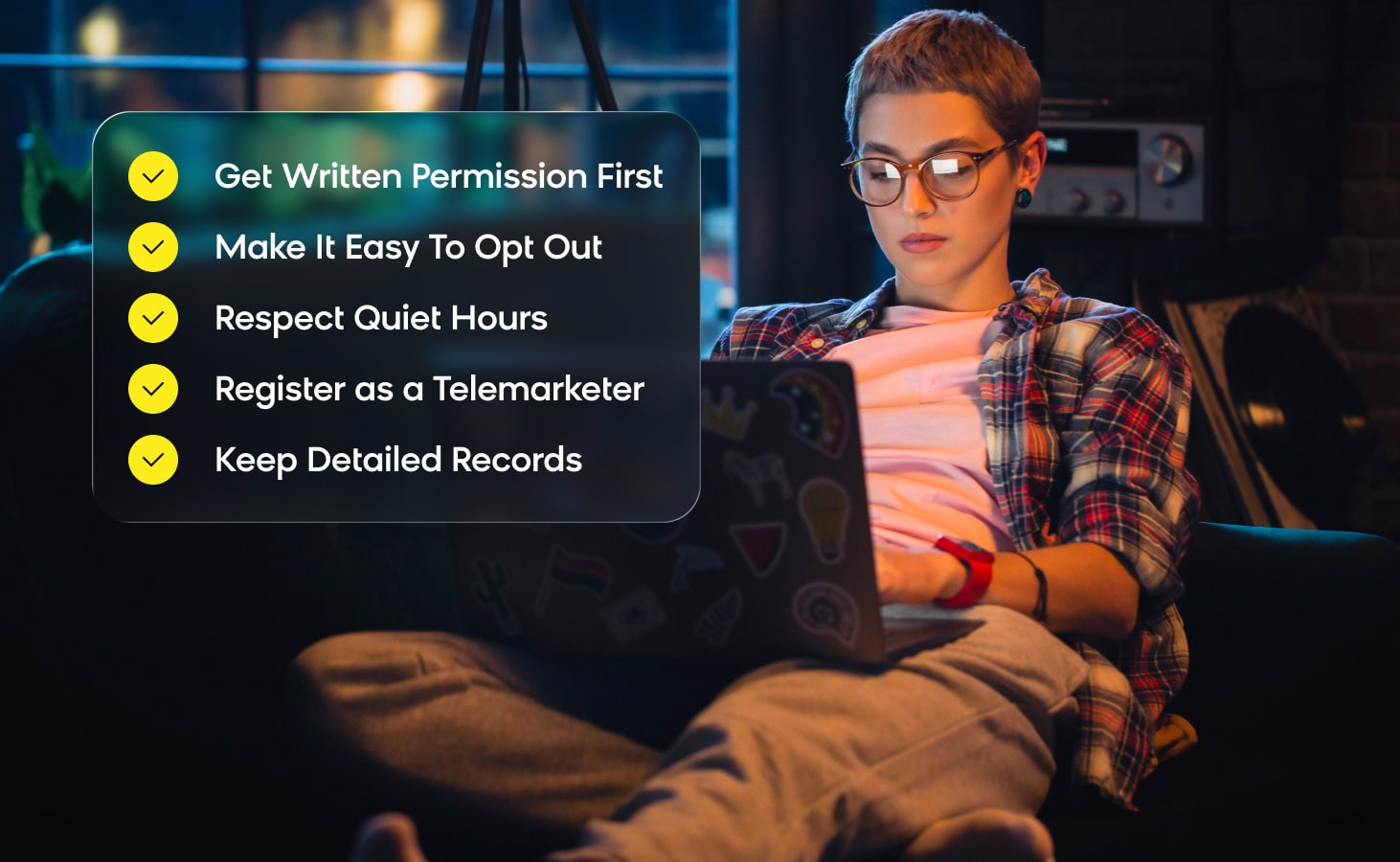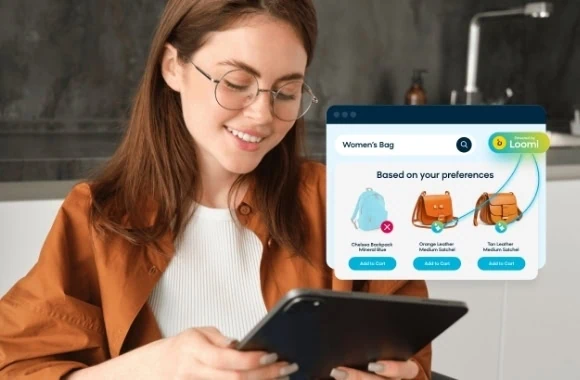Disclaimer: This blog post is intended for educational and informational purposes only and should not be construed as legal advice. The content is general in nature and may not reflect the most current legal developments. Bloomreach strongly recommends that you consult with your legal counsel to determine how Texas Senate Bill 140 and other applicable laws apply to your business.
A new Texas state law will impact how businesses can send text messages, multimedia messages, and make voice calls to customers located in the state.
Texas Senate Bill 140 expands the state’s existing telemarketing rules to cover more types of digital communication — and it comes with serious penalties for companies that fail to comply. If you send mobile messages to customers in Texas, this law will impact you when it takes effect on September 1, 2025.
The good news? Bloomreach has been tracking these changes, and Bloomreach Engagement already includes the tools you need to stay compliant. Let’s break down what you need to know.
How Is Marketing Changing With Texas Senate Bill 140?
While you might already follow federal guidelines, such as the Telephone Consumer Protection Act (TCPA), Texas introduces additional state-specific requirements that may create new obligations, making things trickier for ecommerce marketers. Here’s what the law now covers:
- Text messages (SMS)
- Multimedia messages (MMS) with images or graphics
- Voice calls for sales purposes
The biggest change? Texas residents can now sue businesses directly if they violate these rules. They don’t have to file a complaint with a government agency first — they can go straight to court.

Why Texas Senate Bill 140 Matters for Your Business
The penalties under Texas SB 140 are significant. For each violation, businesses could face:
- Fines between $500 and $5,000
- Triple damages (meaning if you caused $1,000 in harm, you might pay $3,000)
- The customer’s attorney fees
- Additional claims for emotional distress
Customers are also not limited to one lawsuit — they can sue multiple times for repeat violations. This means one mistake could lead to ongoing legal issues if it’s not addressed quickly.
The Texas Senate Bill 140 Compliance Checklist
To stay on the right side of Texas law and avoid harmful penalties, consider reviewing these areas with your legal counsel:
Get Written Permission First
Before sending any automated text/multimedia messages or making voice calls to Texas customers, you must obtain prior express written consent (PEWC) — a written agreement that is clear, signed, and includes specific disclosures as required by TCPA. Moreover, any opt-in checkboxes must be unselected by default, and consent must include disclosure about automated technologies and should have no condition of purchase.
Make It Easy To Opt Out
Every marketing message should include a clear way for customers to stop receiving them. That means having clear “STOP” or “UNSUBSCRIBE” keywords and instructions, and then honoring those requests immediately — not in a few days or weeks.
Respect Quiet Hours
Only send messages during reasonable hours. Many laws, including TCPA, restrict messages to certain hours; consult counsel to determine applicable limits under SB 140.
Register as a Telemarketer
If your business qualifies as a “seller” under Texas Business & Commerce Code 302, and you are engaging in telephone solicitations (including SMS/MMS/voice) to Texas residents, you must:
- Register with the Texas Secretary of State
- Pay a $200 annual filing fee
- Submit quarterly reports identifying your sales representatives
Failure to register could result in penalties of up to $5,000 per violation. Consult with your legal team to determine whether your outreach qualifies and requires registration under this law.
Keep Detailed Records
Save everything: when customers gave consent, when they opted out, what messages you sent, and when you sent them. These records are your protection if questions arise later.

How Bloomreach Can Support Your Compliance With Texas Senate Bill 140
At Bloomreach, we’ve always promoted compliance and have all the built-in tools needed for our customers to adhere to these new requirements:
- Smart consent tracking: Our system automatically records when and how customers give permission to receive messages, including timestamps and consent details.
- Phone number validation: Before sending campaigns, we check phone numbers against databases of known problem numbers, including deactivated lines, reassigned numbers, and numbers belonging to people who frequently file lawsuits.
- Instant opt-out processing: When someone wants to unsubscribe (i.e., they text “STOP” or “UNSUBSCRIBE”), our system immediately removes them from future messages and sends a confirmation — no delays and no manual work required.
- Time zone intelligence: Messages can be set to automatically respect local time zones and avoid sending during quiet hours.
- Complete audit trails: Every campaign, every consent change, and every opt-out is logged and easily accessible, giving you the documentation you need for compliance.
These tools are intended to assist with compliance efforts, but do not guarantee compliance. Each business is responsible for ensuring it meets all legal requirements applicable to its communications.
What Marketers Should Do Now To Prepare for Texas Senate Bill 140
If you send mobile messages to customers in Texas, you should consider taking these steps to prepare for Texas Senate Bill 140:
- Review your current practices against the new requirements
- Enable available compliance features if you haven’t already
- Update your consent collection to ensure you have written permission
- Check your telemarketer registration status with the state of Texas
- Train your team on the new requirements
The most important thing to remember: this isn’t about restricting your marketing — it’s about communicating with customers responsibly. Customers appreciate businesses that respect their preferences and are compliant with local laws and regulations.
Moving Forward With Confidence
Texas Senate Bill 140 represents a significant shift in how states regulate business communications. While the requirements might seem overwhelming at first, they’re manageable with the right tools and processes in place.
At Bloomreach, we’re committed to helping you navigate these changes smoothly. Our compliance features are designed to work automatically in the background, so you can focus on creating great customer experiences rather than worrying about legal requirements.
The key is to act right away, before September 1st. By getting your compliance house in order early, you’ll avoid any last-minute scrambling and ensure your Texas customers continue receiving the valuable messages they’ve opted to receive.
Remember: good compliance isn’t just about avoiding lawsuits — it’s about building trust with your customers and protecting your brand’s reputation. When customers know you respect their preferences, they’re more likely to engage with your messages and remain loyal to your business.
Ready to ensure your campaigns are compliant with Texas Senate Bill 140?
- See how you can use Bloomreach Engagement to stay compliant while taking your SMS marketing strategy to the next level
- If you’re already a customer, contact your Customer Success Manager to review your SMS setup and address any questions
Common Texas Senate Bill 140 Questions
We’re already following federal TCPA rules. Isn’t that enough?
Unfortunately, no. Texas Senate Bill 140 adds state-specific requirements on top of federal laws. You need to comply with both.
Does this really apply to image messages, too?
Yes. The law specifically includes multimedia messages with images or graphics, not just plain text messages.
What if we use a different mobile messaging platform?
The responsibility falls on your business, not your technology provider. Whatever platform you use, you’re still responsible for following the law.
How quickly do we need to process opt-out requests?
Immediately. The law requires real-time processing of unsubscribe requests.
Does SB 140 apply to messages sent with consent?
Yes — even consented marketing messages are covered by SB 140. Prior express written consent (PEWC) allows you to send messages, but the outreach must still comply with all SB 140 rules: proper consent format, sender registration, time-of-day limits, and real-time opt-out handling. Consent does not exempt you from compliance.
Does this apply based on the recipient’s phone number or their residence?
SB 140 is based on where the recipient lives, not just their area code. If someone lives in Texas — even with an out-of-state number— they’re still protected under the law.
Is TCPA list validation enough?
No, TCPA list validation lowers TCPA risk, but key SB 140 requirements like consent capture, registration, and time-of-day compliance must also be met.
Reminder: This FAQ provides general information and is not legal advice. Always consult with qualified counsel for guidance specific to your situation.
References
Official Bill & Legislative Text
- Texas SB 140 Final Bill Text
- Texas Business & Commerce Code Chapter 302 – Telemarketer registration
Legal Analysis and Law Firm Commentary
- Blank Rome LLP – Overview of SB 140 and telemarketing risks
- NatLawReview – What SB 140 changes and why it matters
- CompliancePoint – Summary of SB 140’s implications
- MS Law Group – Deep dive into Texas registration and compliance risks
- ActiveProspect – Clarifying mini-TCPA amendments in Texas
TCPA & Consent Standards
- FCC TCPA Rules – Consent Requirements
- TCPAWorld – Analysis of SB 140’s private right of action













